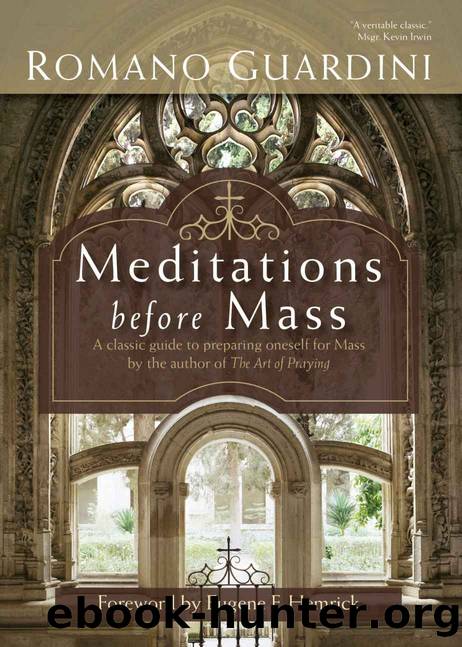Meditations before Mass by Romano Guardini

Author:Romano Guardini [Guardini, Romano]
Language: eng
Format: epub
Publisher: Ave Maria Press
Published: 2014-04-14T00:00:00+00:00
20. Hindrance: Sentimentality
To put it bluntly, sentimentality is essentially the desire to be moved: by loneliness or delight, sorrow or dread; by greatness and exaltedness or weakness and helplessnessâsomehow to be moved. The need is greater with one person than with another, but we all have it to some extent. Strangely enough, it is particularly dominant in people who do not appear at all emotional: self-disciplined men of intellect and will and practical, prosaic natures. From this we see that sentimentality is not the same as real sentiment, which is powerful, unclouded, and chaste. Sentimentality is a half sentiment, a spiritual softness tinged with sensuality. Hence it is strong not only in people without a clear-cut genuine sense of values but also in those who seem to stand completely on âcharacter,â with emphasis leaning so heavily on will and discipline that their neglected feelings easily slide off into the questionable and inferior.
All this has its parallel in the religious life. The sentimental believerâs attitude to the great figures of sanctity, the truths he prefers, the passages he frequently quotes, his whole bearing, everything disposes him to emotionalism.
Up to a certain point there is little that can be said against this; it is simply a predisposition, like a fuzzy mind or weak muscles. But when a believer allows such a tendency to dominate him, it becomes disastrous, robbing revelation of its greatness, distorting the saints, and generally rendering his religious life soft, weak, unnatural, and embarrassing. Examples of sentimentality meet us everywhere; weâve only to glance at the popular spiritual-exercise leaflets, the average samples of âreligious art,â or to read some of the meditations on Christâs passion or on the poor souls in purgatory. One theme in particular has fallen under this deplorable influence: the Sacred Heart. By rights this devotion belongs to the profoundest level of Christian piety. Its expression should be huge with the magnitude of revealed truth and vibrant with the power of Christâs conviction. It should be noble and pure. Instead, it is only too often characterized by an intolerable effeminacy and unnaturalness.
Much more could be said on the subject. At any rate, sentimentality is a force that must be reckoned with. For the sentimental believer, participation in the Mass is extremely difficult. He finds the sacred act neither comforting nor edifying but austere, coldly impersonal, and almost forbidding. And for people like himself he is right. The Mass is austere. Its tremendous concepts are expressed tersely. Its action is simple. Its words are clear and concise; its emotion controlled. Its spiritual attitude is that of profoundest surrender, but still and chaste. Sentimentality tries to gild the lily by transferring its own trimmings to the Mass. The altar, never meant to depart far from the pure form of the sacred table, becomes a pompous welter of cherubs and little lamps and much glitter; the action is garlanded with gestures contrived above all to touch the emotions; the serversâ apparel is fussy and doll-like. Texts and music are of an ingratiating sweetness.
Download
This site does not store any files on its server. We only index and link to content provided by other sites. Please contact the content providers to delete copyright contents if any and email us, we'll remove relevant links or contents immediately.
Resisting Happiness by Matthew Kelly(3341)
The Social Psychology of Inequality by Unknown(3031)
Day by Elie Wiesel(2783)
Designing Your Life by Bill Burnett(2747)
The Giving Tree by Shel Silverstein(2344)
Human Design by Chetan Parkyn(2073)
The Supreme Gift by Paulo Coelho(1978)
Angels of God: The Bible, the Church and the Heavenly Hosts by Mike Aquilina(1969)
Jesus of Nazareth by Joseph Ratzinger(1811)
Hostage to the Devil by Malachi Martin(1803)
Augustine: Conversions to Confessions by Robin Lane Fox(1772)
7 Secrets of Divine Mercy by Vinny Flynn(1746)
Dark Mysteries of the Vatican by H. Paul Jeffers(1723)
The Vatican Pimpernel by Brian Fleming(1703)
St. Thomas Aquinas by G. K. Chesterton(1634)
Saints & Angels by Doreen Virtue(1605)
The Ratline by Philippe Sands(1580)
My Daily Catholic Bible, NABRE by Thigpen Edited by Dr. Paul(1503)
Called to Life by Jacques Philippe(1481)
